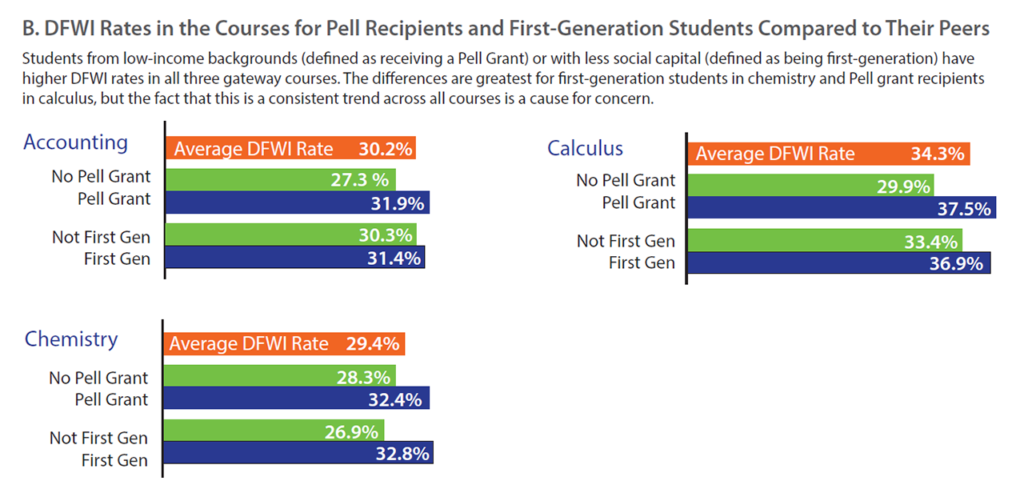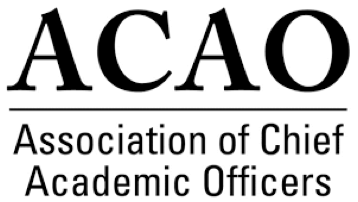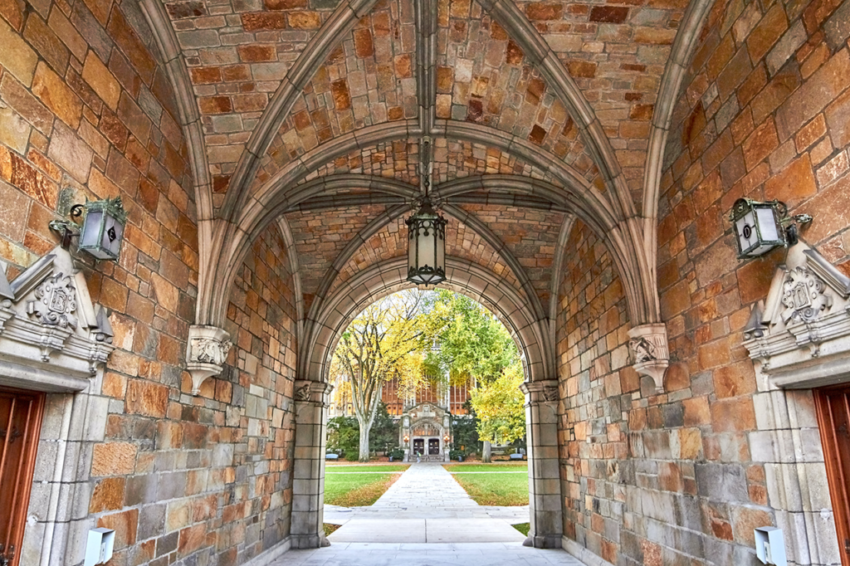At Every Learner Everywhere, we often talk about gateway courses in higher education being a key place that influences student outcomes. What do we mean by a gateway course, and why do we particularly focus on them?
A gateway course is the first credit-bearing college-level course in a program of study. These courses generally apply to the requirements of a degree program and may also be called introductory courses or prerequisites. Typically, every student majoring in a given discipline must pass through the gateway courses.
Depending on the major, common examples of gateway courses include Anatomy or introductory courses in Business, Chemistry, and Psychology.
Oftentimes, general education courses like Applied Algebra, English Composition, or Spanish I or other foreign languages are also referred to as gateway courses since most students must pass through them.
Ideally, gateway courses welcome students into a domain where they learn the foundational skills and knowledge they will need to succeed in the rest of their college careers. In practice, however, gateway courses can act as choke points that slow down student progress or take a lasting toll. And data shows that underrepresented college students are disproportionately held back by gateway courses, leading to lower graduation rates.
Why gateway courses are important to student success and equity
The skills and knowledge students learn in gateway courses go beyond the academic environment, notes Laura Niesen de Abruna, Provost and Vice President of Academic Affairs at York College of Pennsylvania and past chair of the Association of Chief Academic Officers.
“General education is what makes people successful in a complicated society,” says Niesen de Abruna. “The learning outcomes taught in these early courses, whether critical thinking, quantitative skills, or working in teams, are those that have been identified as the outcomes that make you successful.”
Gateway courses set up college students for success, both during their academic career and their professional lives. When students don’t do well in these courses, they’re beginning their college experience with fewer resources. They may lack the knowledge to do well in their chosen major or even to complete their degree.
While this is true for all students, gateway courses can present a particular barrier to low-income, first-generation, minority, and women students. A 2018 Gardner Institute study looked at DFWI rates in gateway courses (the rate of students who either earned grades of D or F, withdrew from the course, or recorded an incomplete). It showed that low-income and first-generation students had disproportionate DFWI rates.

Credit: Digging Into the Disciplines I: Accounting for Failure — The Impact of Principles of Accounting Courses on Student Success and Equitable Outcomes, Gardner Institute, 2018.
The study looked at accounting, calculus, and chemistry courses in particular, where women had DFWI rates up to 8 percent higher than men and African-American students had DFWI rates up to 18 percent higher than white students.
Even more troubling, slower starts to academic careers compounded into lower retention rates. Looking at calculus, for example, among students who had taken the course and had been dismissed by their university after their freshman year, 95 percent were in the DFWI group.
But another hidden population of students were in good academic standing (a 2.0 GPA or higher overall) and chose not to return for the second year: among those, 50 percent of students were in the DFWI group in their calculus course.

Credit: Digging Into the Disciplines I: Accounting for Failure — The Impact of Principles of Accounting Courses on Student Success and Equitable Outcomes, Gardner Institute, 2018.
These outcomes shouldn’t be explained away or ignored, as the report notes: “These courses are often structured to push students out rather than to provide an instruction experience that lifts them up toward their education and occupational goals.”
Widening the gate to achieve equity
“If you’re concerned about student success, it’s not just getting people in the door,” says Niesen de Abruna. “It’s holding on to them. And so your best opportunity to try to get students through programs is to focus on courses that students are likely to take early on in their careers.”
One reason for the gap in student outcomes in gateway courses is that many of these courses have been designed with one type of learner in mind. And as Every Learner Everywhere Executive Director Jessica Rowland Williams points out, student demographics are changing.
“Students are coming from different backgrounds,” she says. “They have different life experiences. They’ve had different educational experiences. And so a one-size-fits all approach to teaching doesn’t really work.”
Related reading: Preparing for a Post-COVID Learning Model That Better Serves Disadvantaged Students
A number of strategies for improving learning outcomes in gateway courses exist, including:
- advising;
- remediation;
- redesigning courses and programs;
- student interventions; and
- digital learning technology.
That last strategy is where Every Learner Everywhere has chosen to focus by helping two- and four-year colleges leverage adaptive learning and other digital learning technologies to raise the retention and success rates of underserved students. When implemented effectively, adaptive courseware can help faculty personalize the learning experience for all students and provide much-needed data to help them identify and work directly with students who are struggling.
Using adaptive courseware in gateway courses represents a tremendous opportunity to provide low-income and minority students with equity, not just access. That is why Every Learner Everywhere partnered with a core group of community colleges and universities to support them in implementing adaptive courseware.
Niesen de Abruna points out that adaptive digital courseware can help students learn better regardless of race or income level. But when used as a targeted tool in places like community colleges and universities with a large number of Pell-eligible students, or in gateway courses where minority and low-income students are disproportionately struggling, it can be a strong lever to improve equity.
“As a practitioner and administrator, I’m interested in any pedagogy that helps students learn more,” says Niesen de Abruna. “And if it also has the opportunity to help students in the minority, it’s more attractive.”
Achieving results with gateway courses
- Read the report on Every Learner Everywhere’s pilot year of work with Lighthouse institutions that received a grant, training, and technical support to redesign gateway courses for the 2019-2020 school year.
- For toolkits for educators working to improve student outcomes visit the Every Learner Resource Library.



